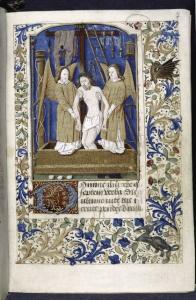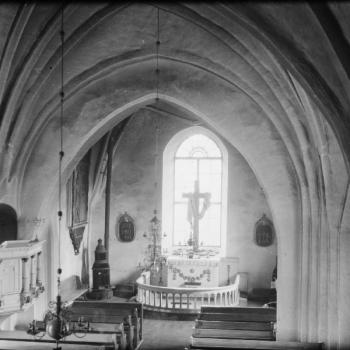
It is tradition in many Byzantine Churches to read from the Paschal Homily of St. John Chrysostom on Easter. Perhaps, the sermon is most famous for its ending:
O Death, where is your sting? O Hell, where is your victory? Christ is risen, and you are overthrown. Christ is risen, and the demons are fallen. Christ is risen, and the angels rejoice. Christ is risen, and life reigns. Christ is risen, and not one dead remains in the grave. For Christ, being risen from the dead, is become the first fruits of those who have fallen asleep. To Him be glory and dominion unto ages of ages. Amen.
It’s a short speech; I recommend the whole thing, though it has some less well-known standout passages, such as this one:
And he shows mercy upon the last, and cares for the first; and to the one he gives, and upon the other he bestows gifts. And he both accepts the deeds, and welcomes the intention, and honors the acts and praises the offering. Wherefore, enter you all into the joy of your Lord; and receive your reward, both the first, and likewise the second. You rich and poor together, hold high festival. You sober and you heedless, honor the day. Rejoice today, both you who have fasted and you who have disregarded the fast. The table is full-laden; feast ye all sumptuously. The calf is fatted; let no one go hungry away.
Enjoy ye all the feast of faith: Receive ye all the riches of loving-kindness. let no one bewail his poverty, for the universal kingdom has been revealed. Let no one weep for his iniquities, for pardon has shown forth from the grave. Let no one fear death, for the Savior’s death has set us free. He that was held prisoner of it has annihilated it. By descending into Hell, He made Hell captive. He embittered it when it tasted of His flesh. And Isaiah, foretelling this, did cry: Hell, said he, was embittered, when it encountered Thee in the lower regions. It was embittered, for it was abolished. It was embittered, for it was mocked. It was embittered, for it was slain. It was embittered, for it was overthrown. It was embittered, for it was fettered in chains. It took a body, and met God face to face. It took earth, and encountered Heaven. It took that which was seen, and fell upon the unseen.
Here it all comes together: poverty and oppression linked to the liberation found in the Resurrection, that moment at which we see what true freedom looks like. We are released, body and soul, because Christ is released from death body and soul. We are, of course, creatures endowed with both. We are not souls with fleshly shells, as some Gnostics held, nor are we merely material beings (even if sometimes I think we Christians would do well to emphasize the material more). Indeed, we are both. As a result, we follow Christ in expectation of this glorious resurrection—freedom from the chains of sin and the oppression of a fallen world.
In other words, we should look to today as not merely a historical event. It is that, yes. It is that day during which the Lord rose from the dead, emptied the tomb, demonstrated, without a doubt, that He is the Son of Man, the Lord of All, the Christ, the King of the Jews, who entreats us to share the Gospel with Jew and Gentile alike. Beyond this, however, today points toward two other things: the life we must live as Christians and the bodily resurrection at the end of time.
First, Pascha reminds us that we are called to be a people of freedom. As St. John Chrysostom tells us in his Paschal Homily:
If any have wrought from the first hour, let him today receive his just reward. If any have come at the third hour, let him with thankfulness keep the feast. If any have arrived at the sixth hour, let him have no misgivings; because he shall in nowise be deprived thereof. If any have delayed until the ninth hour, let him draw near, fearing nothing. If any have tarried even until the eleventh hour, let him, also, be not alarmed at his tardiness; for the Lord, who is jealous of his honor, will accept the last even as the first; he gives rest unto him who comes at the eleventh hour, even as unto him who has wrought from the first hour.













